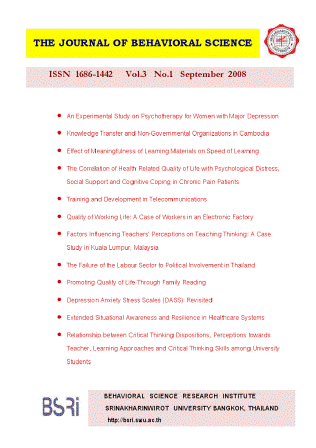Quality of Working Life : A Case of Workers in and Electromic Factory
Main Article Content
Abstract
This research aimed at examining the quality of working life in an electronic factory owned by American businessmen. The samples were 251 workers who classified into 2 levels: 200 operators and 51 supervisors, engineers and middle management. Structured interviews were employed for data collection. Findings reveal that: (1) Minimum wage (149 baht/day) was applied for probation operators, while higher salaries were applied to the others. (2) Working hours for operators were normally 8 hours a day, 6 days a week. Due to low wage, operators thus seek for overtime which benefits them around two-thirds of the total income. Since the overtime had been fluctuated and cut since 2006 due to high competitions and steep drop orders, it effected to labors turn over up to 100 % in some departments, since they felt that it was the sign of insecure jobs. (3) The senses of insecurity were not only among daily workers but also engineers, and supervisors since no clear cut on career path provision, payment and promotion standard systems were in-formally set and ill-informed. (4) The management system was known as “over autonomous but rocky management”, thus some supervisors, engineers and managers requested for international standard management. (5) Despite some workers who worked with harmful machines and in below standard environment had been subsidized with extra money and benefits, but safety and good working conditions should not be ignored.
Keywords: quality of working life, payment, hours of work, security of employment, health at the workplace, work satisfaction


